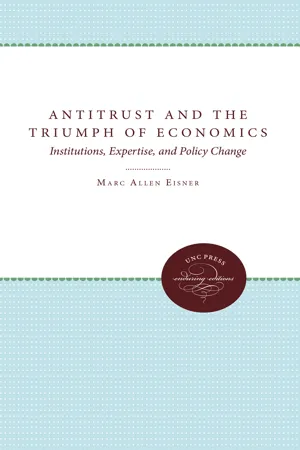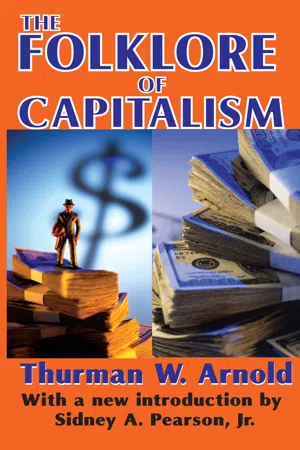History
Trust Busting
Trust busting refers to the government's efforts to break up monopolies and trusts, particularly in the late 19th and early 20th centuries in the United States. This was primarily achieved through antitrust laws and legal actions aimed at promoting fair competition and preventing the concentration of economic power in the hands of a few large corporations.
Written by Perlego with AI-assistance
Related key terms
3 Key excerpts on "Trust Busting"
- eBook - ePub
Antitrust and the Triumph of Economics
Institutions, Expertise, and Policy Change
- Marc Allen Eisner(Author)
- 2017(Publication Date)
- The University of North Carolina Press(Publisher)
CHAPTER ONEAntitrust and the Redefinition of Public Authority
The latter half of the nineteenth century was a time of monumental economic and social transformation. The rise of the modern corporation and trust allowed businesses to plan expansion, manage competition, and realize greater efficiencies. Nonetheless, the revolution in business organization proved to be a source of political unrest because it forced the integration of local economies and created opportunities for corporate abuse. The trusts provided a convenient target of political discontent. The dramatic changes of the period were also a source of great ambivalence insofar as they were difficult to reconcile with competing tenets of American liberalism. The fear of the concentrated economic power of the modern corporation was difficult to justify in light of the ideological legitimacy of market activity. The demands for relief questioned the inviolability of private property. Moreover, a decision to address the trust problem through direct regulation would tax the administrative capacities of the national government while raising the specter of concentrated public authority. Policymakers had to discover some means of governing a burgeoning corporate economy while maintaining allegiance to liberal norms rooted in the eighteenth century.Antitrust policy emerged in this context as a first attempt to force corporate accountability on an economy wide scale. By casting policy as law enforcement, market competition was promoted in a manner fitting within the prevailing norms of government intervention and the practical limitations of the preadministrative state. Although this expansion of public authority was initially resisted by a host of political and corporate interests, by the middle of the twentieth century it enjoyed broad acceptance.1 Writing from the perspective of the postwar period, Richard Hofstadter counted antitrust among the more permanent features of the American political landscape. Appealing to the strong if dormant support for the policy, he noted that “once the United States had an antitrust movement without antitrust prosecutions; in our time there have been antitrust prosecutions without an antitrust movement.”2 Indeed, the place of antitrust seemed so well established that it was often understood as much a national tradition as an economywide microeconomic policy. Noting the almost irrational devotion to antitrust, Andrew Shonfield went as far as to describe antitrust as nothing less than an American religion.3 - eBook - ePub
- Reeve Robert Brenner(Author)
- 2017(Publication Date)
- Routledge(Publisher)
By unscrupulous men, of course, we mean men who were not caught in the common ethics with regard to “bigness,” and who were therefore ready to use practical means to avoid the handicap which such ethics put upon the formation of organizations. We do not mean unkindly men. The careers of Carnegie and Rockefeller show that they had a strong sense of social obligation which asserted itself after the conflict over their methods had died down. The term “unscrupulous,” being a polar word, is full of traps. It has no meaning other than describing an individual who is not caught in any particular set of scruples. It means nothing in a vacuum, other than a realization that the most effective means are the best to obtain a given end.In this atmosphere the antitrust laws were the answer of a society which unconsciously felt the need of great organizations, and at the same time had to deny them, a place in the moral and logical ideology of the social structure. They were part of the struggle of a creed of rugged individualism to adapt itself to what was becoming a highly organized society.Thus in those days anyone who attacked the “Trusts” could achieve the same public worship as a minister of the gospel who had the energy to attack vice. It was this that made Theodore Roosevelt a great man. Historians now point out that Theodore Roosevelt never accomplished anything with his Trust Busting. Of course he didn’t. The crusade was not a practical one. It was part of a moral conflict and no preacher ever succeeded in abolishing any form of sin. Had there been no conflict—had society been able to operate in an era of growing specialization without these organizations—it would have been easy enough to kill them by practical means. A few well-directed provisions putting a discriminatory tax on large organizations would have done the trick, provided some other form of organization were growing at the same time to fill the practical need. Since the organizations were demanded, attempts to stop their growth necessarily became purely ceremonial. As fast as one cloak was stripped off and declared illegal by the courts, other cloaks were manufactured and put on. The antitrust laws, being a preaching device, naturally performed only the functions of preaching.1The actual result of the antitrust laws was to promote the growth of great indus trial organizations by deflecting the attack on them into purely moral and ceremonial channels. The process was something like this: Since the corporation was a person, mere bigness could not make it a bad person. One cannot condemn his neighbor simply because he is big and strong. Therefore, the courts soon discovered that it was only “unreasonable” combinations which were baci, just as any court would decide that a big, strong neighbor should not be incarcerated so long as he acted reasonably. In various other ways the actual enforcement of the antitrust laws was completely emasculated by the courts,2 - eBook - ePub
- John Roscoe Turner(Author)
- 2019(Publication Date)
- Routledge(Publisher)
laissez-faire and the new idea of restraint are one and the same in essence and purpose. The former would not have competition destroyed: The latter would have competition preserved. Both adhere to the faith that natural development depends on competition.1 John Bates Clark, Essentials of Economic Theory, p. 385.14. The Sherman Anti-Trust Law.The common-law proved inadequate to deal with the unfair practices of monopolies and trusts. Restraints of trade were treated as questions of private rights and the broader aspects of public policy were virtually ignored. The public, therefore, was not behind the law, making sure its enforcement. Meanwhile, large combinations were extending their influence and the people felt the pressure of their power. Conflicts of interest as between producers and consumers were difficult of adjustment, due to the complex economic problems in modern industry which neither side understood. Nor were the courts possessed of clear vision. The cases, for the most part, involved complex economic problems, and lawyers rather than economists decided them.An awakened public opinion first turned against the railroads and the Interstate Commerce Act of 1887 was passed. This was followed by the Sherman Act of 1890. The purpose of this act was to protect the public against the evils of trusts. The act declared against contracts, combinations, or conspiracies in restraint of trade or commerce . It provided that persons who monopolize or attempt or conspire to monopolize any part of the trade or commerce between states, or with foreign countries, shall be punished. The punishment for disobeying the law may be by fine (not more than $5,000), Or imprisonment (not more than one year), or both, in the discretion of the court.15. The Prevention of TrustsIn the last several years no little has been said and written on "trust-busting." Many thoughtful persons believe that under our laws existing trusts cannot be destroyed and competition restored. Others believe that the restoration of competition is possible in the fields now dominated by trusts. The fact is that vigorous enforcement of anti-trust laws are too recent to warrant a conclusion on the restoration of competition. The Sherman Law was little more than a dead letter prior to 1911. The methods by which the law was enforced were too gentle to test its power. The punishment of offenders consisted of a light fine rather than imprisonment. It was good business for corporations to break the law. If one is fined $5 for an act which profits him $10, it is good business to perform the act. These fines have been much like the student's matriculation fee —a necessary nuisance, but when paid it is settled once for all. It has rarely happened that a trust has been punished more than once. Other trusts escaped fine, merely being informed that their acts were illegal. Trust activities are little restrained under such enforcement. Not the terminology of the law but the rigor of its enforcement is the significant thing. Trusts fear but little the possibility of a fine, but the lawbreaker does fear the jail.
Learn about this page
Index pages curate the most relevant extracts from our library of academic textbooks. They’ve been created using an in-house natural language model (NLM), each adding context and meaning to key research topics.


